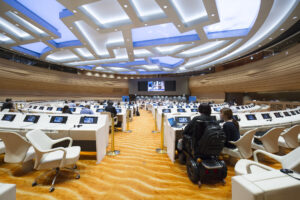Today, the Lawyers for Human Rights (LHR), the Socio-Economic Rights Institute (SERI) and the International Commission of Jurists (ICJ) draw the government’s attention to the need to fully consider its domestic law and international human rights law obligations as it continues the process of developing its National Labour Migration Policy and refining the proposed amendments to the Employment Services Act 4 of 2014.
The government had invited public submissions on both the National Labour Migration Policy and the Employment Services Amendment Bill, by 28 May 2022. The ICJ provided support on international law to a group of civil society organizations, including LHR and SERI, in developing their joint submissions. An international perspective provides useful framing to assess the extent to which national legislative amendments are in line with South Africa’s international, including African regional legal obligations.
The proposed policy and legislative amendments have received much media attention in South Africa, in significant part because of the proposal to implement quotas for the employment of those legally defined as “foreign nationals” in South Africa. If enacted, the Bill would empower the Minister of Employment and Labour in South Africa to by notice “specify a maximum quota for the employment of foreign nationals by employers in any sector”. The Policy, on the other hand, frames this proposal as reserving a “percentage generally be set at 60%” of total staff complements for South African citizens and permanent residents.
“It is evident from our consultations with our client groups, including farm workers and domestic workers that there is little if any support for the implementation of these employment quotas for non-nationals in South Africa”, said Nomzamo Zondo, SERI’s Executive Director.
“In reality these quotas simply pit local workers against migrant workers and increase the already substantial risk of South African law and policy fuelling xenophobia and xenophobic violence, contrary to the repeated warnings of South African Courts”, she added.
In addition, the Bill in particular, will come under significant scrutiny from organizations advocating for the rights of asylum seekers and others seeking protection under international law. While rightly including an amendment which excludes refugees from the definition of “foreign national”, the Bill reinforces the significant challenges faced by asylum seekers in accessing work.
“It is simply not possible for asylum seekers to access the documentation required by the Bill in order for them to be easily employable despite being defined as ‘foreign nationals’. Though the Supreme Court of Appeal has made it abundantly clear that asylum seekers have the right to work in terms of their fundamental right to human dignity”, said Sharon Ekambaram, Head of Refugee & Migrant Rights Programme at LHR.
“The government knows full well that, thousands of asylum seekers have struggled to gain access to the Refugee Reception Offices to regularise their stay in the country, a situation exasperated under COVID-19. This is further compounded by the fact that a significant number of people have been waiting for over 10 years to have their claims for refugee protection confirmed”, she added.
“In this context, insisting that asylum seekers comply with the same or similar documentary requirements as other non-nationals will effectively deprive them of meaningful and lawful access to work while they await the determination of their applications for asylum, making a mockery of the urban integration component of the Refugees Act”, she concluded.
SERI and LHR also make other crucial submissions on specific provisions of the Bill that conflict with domestic and international human rights law and standards. For instance, both the Policy and the Bill seem to support an expanded role for labour inspectors which would empower them to perform some functions in terms of the Immigration Act 13 of 2002.
This provision is in direct conflict with South Africa’s obligations in terms of the International Convention on Economic, Social and Cultural Rights, as made clear by the UN Committee on Economic, Social and Cultural Rights. It also contradicts South Africa’s obligations in terms of the ILO Labour Inspection Convention, Article 3, which prohibits entrusting labour inspectors with any duty which will “interfere” with their primary duty to protect workers’ rights or “prejudice in any way the authority and impartiality which are necessary to inspectors”.
“While it is a good sign that both the Policy and the Bill seek to ensure compliance with a range of international instruments to which South Africa is bound, the actual engagement with international standards remains superficial, and at places the proposed policy and legal reforms are at odds with international standards expressly cited”, said Kaajal Ramjathan Keogh, ICJ Africa Director.
“The inappropriate role allocated to labour inspectors to enforce immigration law is just one example of this problem. While the Policy itself explicitly lists the Labour Inspection Convention as relevant and applicable, it fails to show any attempt to comply with South Africa’s obligations in terms of it”, she added.
Downloads
SERI and LHR’s joint submission on the Policy and Bill is available here.
ICJ’s Briefing Paper on the Right to Work of Non-Citizens in South Africa is available here.
An infographic on the Policy and Bill can be downloaded here.
Background
This advocacy forms part of broader advocacy conducted by ICJ in partnership with civil society organizations in South Africa to advance and promote the right to work of non-citizens in South Africa. As a recently completed survey published by the South African government shows, xenophobia and xenophobic attitudes remain prevalent in the country. These issues have, on a regular basis resulted in xenophobic violence, including the well-documented murders of non-citizens, often defined by South African law as “foreign nationals”.
Last year, the ICJ, SERI and LHR applauded the Gauteng Provincial Government for withdrawing a chapter of a proposed Bill that would have completely excluded non-citizens from working in large range of sectors in the province.
For more information:
Mulesa Lumina, Communications and Legal Officer – ICJ Africa Programme, e: Mulesa.Lumina@icj.org, m: +27 79 271 2275
Kaajal Ramjathan-Keogh, Director – ICJ Africa Programme, e: Kaajal.Keogh@icj.org, m: +27 84 514 8039
Nomzamo Zondo, Executive Director – Socio-Economic Rights Institute, e: nomzamo@seri-sa.org, m: +27 71 301 9676
Yvonne Erasmus, Senior Researcher -Socio-Economic Rights Institute, e: yvonne@seri-sa.org, m: +27 83 518 3870
Sharon Ekambaram, Head of Refugee & Migrant Rights Programme – Lawyers for Human Rights, sharone@lhr.org.za, m: +27 83 634 8924




